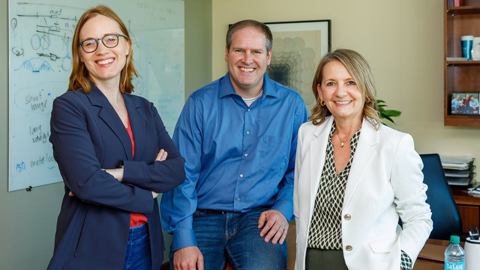Institute launches a new AI initiative to power biological research
With artificial intelligence (AI) poised to greatly accelerate the pace for novel discoveries in foundational biological research, the Stowers Institute launched the Office of Scientific Leadership AI Initiative, a new program designed to advance capabilities in machine learning and AI for addressing critical biological questions. Investigator Julia Zeitlinger, Ph.D., has been appointed to lead this effort and leverage cutting-edge computational techniques to accelerate scientific discoveries and drive innovation in biological research.

Zeitlinger will work to develop and execute a long-term strategy to build world-class AI-powered computational expertise. She will head the steering committee that, together with Chief Information Officer Evelyn Travnik and Director of Scientific Data Jay Unruh, Ph.D., prioritizes and implements computational efforts across the organization. She also advises the Stowers Fellows program and the Graduate School to attract, support, and maintain computational talent at the Institute.
“Biology is incredibly complex, and AI is an excellent way to detect the underlying patterns and rules. A great example is the information encoded in our DNA, how it us used to create gene products like proteins, and how those gene products function to support life,” said Zeitlinger. “I am passionate about leading the Institute’s new initiative to promote AI in our scientific research. It is both an exciting challenge and a huge opportunity.”
A fundamental biological quest is to understand how variations within our genetic code and the molecules arising from it not only make us unique but can also underlie disease or disease susceptibility. AI’s predictive capabilities can guide targeted experimental approaches to identify how these variations impact gene regulation and protein function, key factors governing development, health, and disease.
“Many of our investigators including Zeitlinger and our Technology Center scientists are engaged in the pursuit of understanding how sequences within our DNA genetic blueprint control gene activity and how the shape of proteins affects their function,” said Stowers Scientific Director Kausik Si, Ph.D.
“Leveraging the power of AI will enable researchers Institute-wide to answer questions that remain some of the biggest biological mysteries for the benefit of all,” said Stowers President and Chief Scientific Officer Alejandro Sánchez Alvarado, Ph.D.
This article is republished from Stowers News. Read the original here.
Enjoy reading ASBMB Today?
Become a member to receive the print edition four times a year and the digital edition monthly.
Learn moreGet the latest from ASBMB Today
Enter your email address, and we’ll send you a weekly email with recent articles, interviews and more.
Latest in Science
Science highlights or most popular articles

Avoiding common figure errors in manuscript submissions
The three figure issues most often flagged during JBC’s data integrity review are background signal errors, image reuse and undeclared splicing errors. Learn how to avoid these and prevent mistakes that could impede publication.

Ragweed compound thwarts aggressive bladder and breast cancers
Scientists from the University of Michigan reveal the mechanism of action of ambrosin, a compound from ragweed, selectively attacks advanced bladder and breast cancer cells in cell-based models, highlighting its potential to treat advanced tumors.

Lipid-lowering therapies could help treat IBD
Genetic evidence shows that drugs that reduce cholesterol or triglyceride levels can either raise or lower inflammatory bowel disease risk by altering gut microbes and immune signaling.

Key regulator of cholesterol protects against Alzheimer’s disease
A new study identifies oxysterol-binding protein-related protein 6 as a central controller of brain cholesterol balance, with protective effects against Alzheimer’s-related neurodegeneration.

From humble beginnings to unlocking lysosomal secrets
Monther Abu–Remaileh will receive the ASBMB’s 2026 Walter A. Shaw Young Investigator Award in Lipid Research at the ASBMB Annual Meeting, March 7-10 in Washington, D.C.

Chemistry meets biology to thwart parasites
Margaret Phillips will receive the Alice and C. C. Wang Award in Molecular Parasitology at the ASBMB Annual Meeting, March 7-10 in Washington, D.C.

